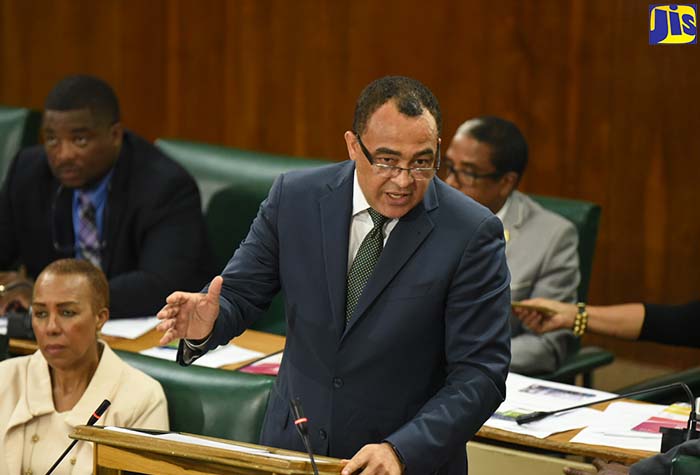Government to Implement Policy to Reduce Sugary Drinks in Schools
By: , June 6, 2018The Key Point:
The Facts
- This was disclosed by Minister of Health, Dr. the Hon. Christopher Tufton, during his contribution to the 2018/19 Sectoral Debate in the House of Representatives on June 5.
- “By sugary drinks we mean beverages that contain sugar, syrup added by the manufacturer. It does not include 100 per cent juice or unsweetened milk,” he said, adding that it is part of the response to the obesity crisis.
The Full Story
Effective January 2019, the Government will implement a policy to restrict certain types of sugary drinks in schools and public health institutions.
This was disclosed by Minister of Health, Dr. the Hon. Christopher Tufton, during his contribution to the 2018/19 Sectoral Debate in the House of Representatives on June 5.
“By sugary drinks we mean beverages that contain sugar, syrup added by the manufacturer. It does not include 100 per cent juice or unsweetened milk,” he said, adding that it is part of the response to the obesity crisis.
He said the Ministry of Education, Youth and Information and the Ministry of Health will work with manufacturers and distributors to provide the policy guidelines on what the requirements are for these drink products to be allowed in schools.
The Minister said starting next week, the Ministry’s team will meet with players in the sector to discuss the adjustment of formulas.
“If we are going to impose it in schools, I believe in public health we must also lead by example, and so the same policy will become effective. Except for where there are prescribed dietary guidelines for patients, the same policy will be introduced in our public health infrastructure across the length and breadth of this country,” he said.
In the meantime, the Health Minister said policy and regulatory framework will be an important area of focus targeting key initiatives to reduce the causes of non-communicable diseases (NCDs).
He said the obesity level among high-school-age cohorts is a major challenge. Citing a 2017 Global School Health Survey, Dr. Tufton said childhood obesity over the past seven years poses a threat to the health gains that have contributed to the increase in life expectancy in Jamaica.
“The prevalence of obesity in adolescents 13 to 15 years increased by 68 per cent and doubled in boys over the past seven years. Another recent study indicated that obesity-related non-communicable diseases are the top health concern for Jamaicans,” he said.
Dr. Tufton informed that Jamaica ranks in the top 10 globally for soft-drink consumption in adolescents, aged 13 to 15, adding that sugary-drink consumption is above the recommended amounts for maintaining good health in Jamaican children.
“Approximately 70 per cent of Jamaican children consume one or more sugar-sweetened beverage per day and 77 per cent of our adults consume one or more sugar-sweetened beverage per day.
This is a serious problem. Consumption of one or more servings of sugar-sweetened beverages per day is associated with a 26 per cent greater risk of developing Type 2 diabetes,” he said.
The Health Minister said the prevalence of harmful use of alcohol and tobacco remains high, and that too many Jamaicans are drinking too much, and are smoking.
Meanwhile, Dr. Tufton said the Ministry of Education, Youth and Information and the Ministry of Health are finalising plans for a nutrition policy that will guide offerings in schools as part of the pushback on unhealthy eating habits, including the provisions by the Government through Nutrition Products Limited.
“We are also close to that completion. The initiative intends to provide a framework for young people to eat healthy, nutritious meals in schools, and the policy will need the support of all stakeholders to achieve the success that is required,” he said.
Dr. Tufton pointed out that the standards will focus on reducing the intake of saturated fats, cholesterol, sodium and sugar, and increasing vegetable and fruit consumption.




